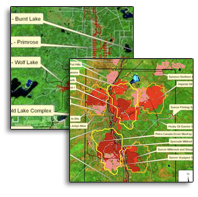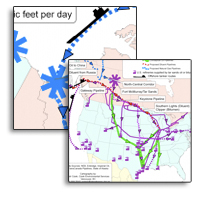Tar Sands 101
The Tar Sands "Gigaproject" is the largest industrial project in human history and likely also the most destructive. The tar sands mining procedure releases at least three times the CO2 emissions as regular oil production and is slated to become the single largest industrial contributor in North America to Climate Change.
The tar sands are already slated to be the cause of up to the second fastest rate of deforestation on the planet behind the Amazon Rainforest Basin. Currently approved projects will see 3 million barrels of tar sands mock crude produced daily by 2018; for each barrel of oil up to as high as five barrels of water are used.
Human health in many communities has seriously taken a turn for the worse with many causes alleged to be from tar sands production. Tar sands production has led to many serious social issues throughout Alberta, from housing crises to the vast expansion of temporary foreign worker programs that racialize and exploit so-called non-citizens. Infrastructure from pipelines to refineries to super tanker oil traffic on the seas crosses the continent in all directions to allthree major oceans and the Gulf of Mexico.
The mock oil produced primarily is consumed in the United States and helps to subsidize continued wars of aggression against other oil producing nations such as Iraq, Venezuela and Iran.
To understand the tar sands in more depth, continue to our Tar Sands 101 reading list
G & M: Softening up the Public for the massive import of Workers with No Rights
A clip from the entire article below:
"Mr. Stelmach said the province's decision to sign a special immigration deal with Ottawa earlier this year is part of that strategy. The agreement is expected to make it easier and faster for immigrants to settle in the province by cutting red tape. It will also give the province more control over selecting skilled immigrants."
Husky Energy looking for new Refineries
Approximately only a month ago the first new refinery in decades was announced to be under construction in the lower 48 states. This is not to be the last, as the absolutely unparalleled growth of the tarsands is leaving bottle neck-like conditions for transporting the sludge-then-crude-then petrol through the refining processes across Turtle Island. Husky will no doubt go along with some of the foreseen upgrading of facilities, rather than worry about an entirely new refinery. It's all a part of the largest project in history.
--M
Husky on the prowl for refining capacity
Royal Dutch Shell: Reviewing Assets and more across Canada
When Royal Dutch Shell recently bought out Shell Canada, the world's most notorious oil corporation became directly involved in many of the world's most deadly plans for the environment, social rights and indigenous self-determination. In northern British Columbia, RD Shell has inherited an exploration permit to look in the sacred headwaters of the Nass, Skeena and the Stikine rivers for Coalbed Methane, perhaps the single worst water damaging form of gas extraction that has been linked to stillbirths in animals and humans nearby.
CNPC withdrawal will not stop Gateway Pipeline: Enbridge
Enbridge still online with Gateway project
Jul 12, 2007 06:31 PM
http://www.thestar.com/Business/article/235384
Dina O'Meara
Canadian press
CALGARY–Enbridge Inc. was taken by surprise Thursday by comments PetroChina, its major partner in an ambitious Alberta to British Columbia pipeline, was pulling out of the $3-billion project.
"We have not discussed CNPC's comments with them," spokesperson Glenn Herchak told The Canadian Press. "So it would not be appropriate to comment."
U.S Refineries Investing to Handle Tar Sands
http://www.isa.org/InTechTemplate.cfm?Section=InTech_Home1&template=/Con...
InTech Home InTech Home
12 July 2007
Refineries retrofit for goop and gunk
Some oil companies are staking much of their future on the gunky oil that comes out of Canada’s oil sands. Automation has a piece of this action.
The Wall Street Journal reported the first crude from the Albertan oil sands reached the giant Cushing, Okla., pipeline hub last year.
Black gold's tarnish seen in Canada-- LA Times
Black gold's tarnish seen in Canada
Cash and jobs flow bountifully from Alberta's oil sands, but they come at a cost to the environment and native peoples.
By Tim Reiterman, Times Staff Writer
July 8, 2007
http://www.latimes.com/news/nationworld/world/la-fg-oilsands8jul08,0,732...
FORT MCMURRAY, CANADA — The Aurora Mine exudes the odor of petroleum and the look of untapped riches.
"Alberta's inflation is everyone's interest"
Alberta's inflation is everyone's interest
MICHAEL MENDELSON
Globe and Mail Update
http://www.theglobeandmail.com/servlet/story/RTGAM.20070711.wcomment0712...
July 11, 2007 at 11:45 PM EDT
Expedition to raise awareness about threats to Athabasca River
By Lynn Martel - Rocky Mountains
Expedition to raise awareness about threats to Athabasca River
http://www.rockymountainoutlook.ca/portals-code/list.cgi?paper=128&cat=4...
Jul 11 2007
"Water is the ultimate traveller. It flows off mountains, all the way to oceans, and it can fly too."
What they didn't want you to know: oil's dirty little secret
What they didn't want you to know: oil's dirty little secret
Copyright 2007 Lloyd's List International
All Rights Reserved
Lloyd's List // July 13, 2007
The theory of Peak Oil is that world production will peak and plateau
at a undefined point in time and then begin to decline, while demand
continues to rise Five decades after it was first brought to the
world's attention, the finite supply of oil and what this means is
only just being accepted
"IT'S the end of the world as we know it", sang US rock band REM, a
The Richest First Nation in Canada
The Richest First Nation in Canada
by Macdonald Stainsby / July 10th, 2007
http://www.dissidentvoice.org/2007/07/the-richest-first-nation-in-canada/
The primarily indigenous and mostly Cree (also ‘Chipewyan Dene’) community of Fort MacKay — just north of the internationally famous tar sand “boom” city of Fort McMurray — is said to be the “richest First Nation in Canada.” The question should be asked: How well does this reach the entire community, and does the economic benefit outweigh the cost?



